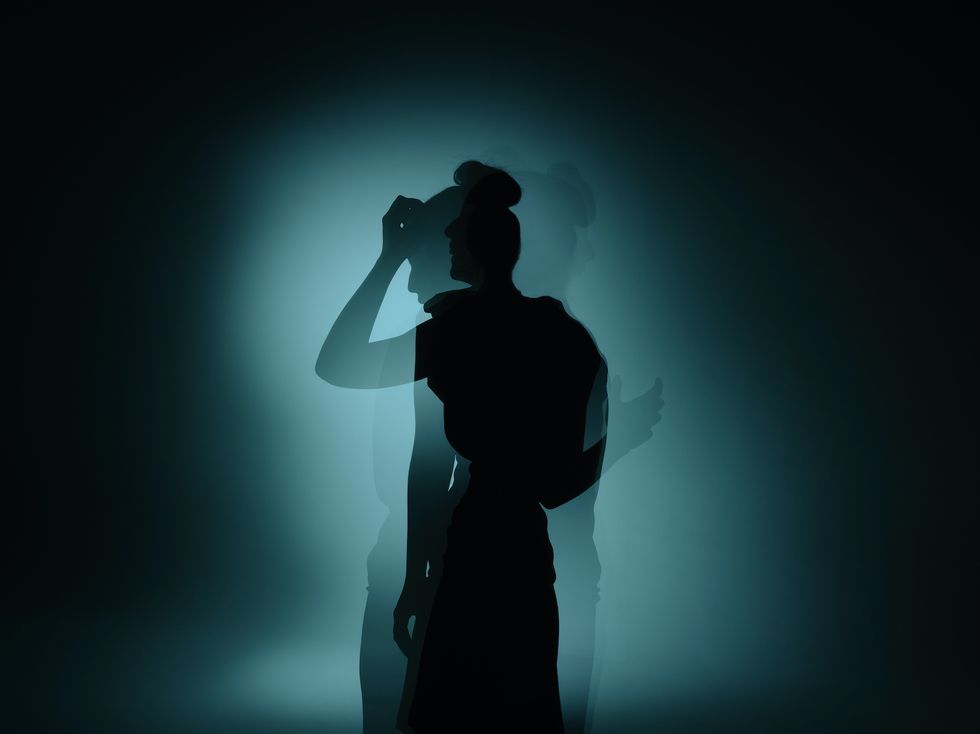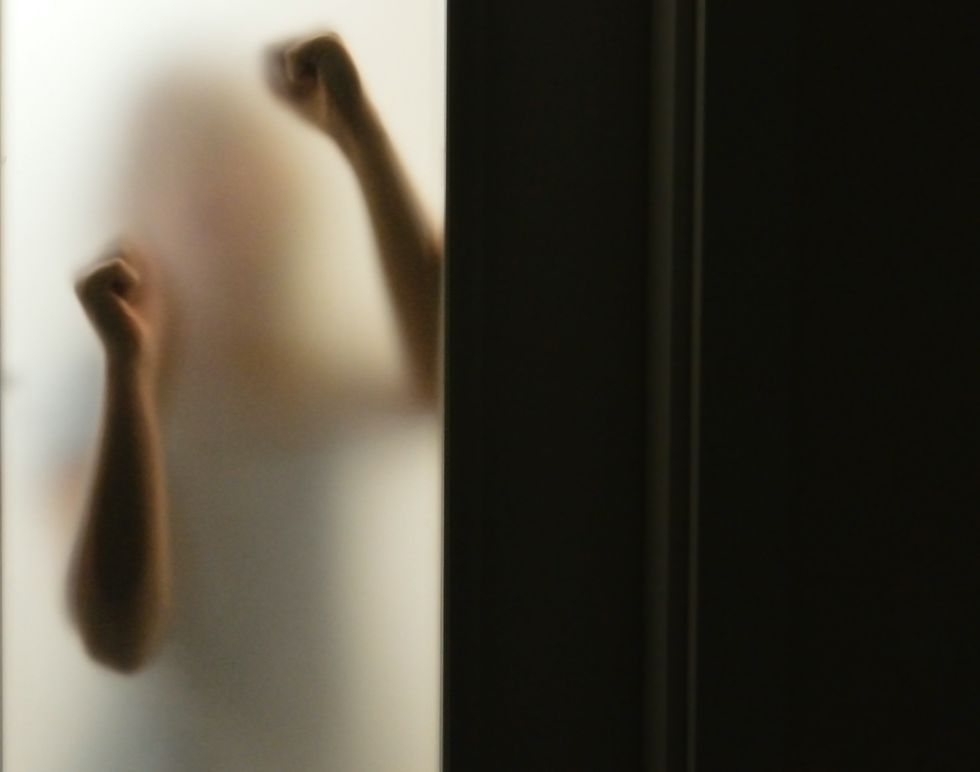Last month I let out the most guttural scream of my life. Having just stepped out of the shower, instead of wrapping my body in a towel, I buried my face deep within its cotton fibres and let out an unexpected, rib cage-rattling roar. I wasn’t in danger, nor shock. I hadn’t suffered a bereavement, nor the type of heartbreak that hits like a tsunami, before spreading across the body like a slow bruise. Rather, for the first time ever, I felt an inexplicable, wholly-consuming rage that erupted out of me like a geyser. While my boyfriend in the next room was oblivious to this muffled outburst, I convinced myself that it was a sign I was one burnt slice of toast away from a mental breakdown.
I’ve never identified as an angry person. That’s not to say grievances like family disagreements, work politics or social injustices don’t sting. I’ve just simply never allowed myself to ‘go there’ for fear of it shattering the veneer of cool, collected perfection I’ve spent the best part of 30 years constructing. I’ve always viewed anger to be an ugly blemish on a personality. Angry people, I thought, were weak, unpredictable and, above all, unlikeable. The kind you cross the street to avoid or ogle at outside a bar come 2am.
In the last month, the world has borne witness to unprecedented degrees of anger, both healthy and deeply concerning.
Following her release from a detention centre in Iran after six years, Nazanin Zaghari-Ratcliffe let out a stream of articulate fury. Why had it taken nearly six years to get her home? She was supposed to just be grateful to see her daughter, who was two when she was first detained, but she had to confront the fact her child was now eight and she'd missed out on so many crucial years of her life. While she was widely applauded for speaking truth to power, her critics condemned her as 'ungrateful' and 'arrogant'. On the contrary, her anger was powerful in its directness and eloquence.
Meanwhile, social media has been on tenterhooks watching Britney Spears' outpouring of now-uncensored vitriol towards her family, following the end of her 14-year-long conservatorship. Kanye West's toxic posts, following the demise of his marriage to Kim Kardashian and her new relationship with Pete Davidson, have also let us in on one man's unfettered acrimony. Anger has become a form of entertainment.
And now, Will Smith has displayed perfectly the dangers of pent up frustration. After hearing comedian Chris Rock make a joke about his wife Jada Pinkett-Smith’s shaven head (the actor lives with alopecia) at the 94th Academy Awards on Sunday, the Best Oscar winner jumped up on stage and slapped the presenter across the face. Over the last 48 hours, his outburst has dominated the global conversation, with some Twitter users calling out the actor’s 'controlling' and 'abusive behaviour', while the likes of Tiffany Haddish and Nicki Minaj have praised him for defending the honour of his wife.
Now, more than ever, we need to find healthy ways to channel what appears to be a bubbling over of collective rage.
When it comes to my own ear-splitting exhibition of anger, Julie Scott, a vocal coach in the Hague, assures me screaming can be a healthy physical reaction to stress. ‘Afterwards your body feels as if you've gone to the gym. It energises you and it’s incredibly meditative,’ she explains. In the spring of 2020, Scott launched Screech At The Beach – a psycho-therapeutical initiative born out of boredom and frustration during lockdown. Every morning, Scott and as many as 25 people would gather on the beach to yell into the North Sea wind. ‘It’s like throwing a dart,’ she says of vocalising anger. ‘You see it a lot in martial arts when people are going to hit through a bit of wood, they let out a screech because it helps to focus.’
Primal therapy – otherwise known as scream therapy – is a psychotherapy, popularised in the 1970s by Arthur Janov, which encourages patients (John Lennon, Yoko Ono and Kanye West have tried the practice) to recall a repressed, traumatic experience and let it out in an unrestrained bellow. While the long-term effectiveness of the therapy has been widely disputed, London-based psychologist Zoe Aston says that screaming can be a positive way to self-sooth. ‘It’s animalistic. Part of it is about getting in touch with not needing to understand or intellectualise how you’re feeling.’
At the height of the pandemic, Aston launched a scream therapy campaign for the Icelandic Tourism Board which invited frustrated strangers from across the globe to upload a recording of their scream on a website, which would then be played out loud in the wilderness. Aston says the thought of voluntarily screaming only sounds bizarre because we don’t often allow ourselves to physicalise our emotions. ‘For lots of people, intellectualising is the main defence mechanism. It gives us a sense of control because emotions are messy and don’t always make sense; we don't like the chaos that can come with admitting that we're feeling so angry that we feel rage, or so sad that we feel like we're never going to stop crying.’
Mike Fisher, the director and founder of the British Association of Anger Management, tells me that everyone has a relationship with anger, whether we like to admit it or not. In fact, he says, it’s actually individuals like me who usually refuse to acknowledge the feeling who can prove to be ‘the most dangerous’. ‘Angry people are often perfectionists to the extreme because they don’t get criticised,’ he says. ‘But the price they pay is not only the pain that affects them, but everybody around them. If you don’t meet the standards of the perfectionist, you’re going to have to deal with the fallout. It’s like walking on glass around them - you don’t know when they’re going to switch.’ By the very nature of anger being a rogue, explosive energy, he says it can only be repressed for so long. My post-shower outburst (the result of ongoing delays to our house sale, mounting work stress and a friend flaking on dinner plans last-minute), case in point.
Contrary to popular belief, anger is not the Hulk-like action of screaming, fist-throwing and door slamming. ‘Anger is simply a feeling,’ notes Fisher, adding that the most common misconception of it comes when people conflate the feeling with aggression. Aston notes that anger is essential to our survival and one of the healthiest feelings humans can have. ‘Anger is how you know where your boundaries are or need to be, who's safe and who's not safe, and how much capacity you’ve got to give or to receive on any given day. It's a good marker for how you are feeling,’ she says.
The trouble with anger, the experts agree, isn’t so much the feeling itself, so much as the way we understand and express it, whether it’s through behaviours like gaslighting and ghosting, being passive aggressive, or violent.
Over the last two years, the world’s collective trauma from the pandemic has pushed our coping abilities to breaking point. ‘The whole pandemic, for a lot of people, was just a huge grieving process,’ says consultant clinical psychologist Isabel Clarke. ‘And anger was a really big part of that.’ The pandemic prompted the demise of relationships, the emergence of rage quitting (a third of millennials plan to quit their job after the pandemic, according to Forbes) and an incandescent fury aimed at anti-vaxxers and lockdown rule breakers. But for others it had far more dangerous outcomes, such as a surge in abusive behaviours like gun violence and domestic abuse. (Counting Dead Women, a group that tracks femicide in the UK, identified at least 16 murders of women by men in the first three weeks of lockdown).
As for me, the loss of structure in lockdown proved to be a living nightmare. To claw back some semblance of control, I pushed myself to work overtime, set punishing fitness challenges and remained in constant contact with friends on WhatsApp to the point of exhaustion. While others openly discussed their grievances with being trapped inside a pressure cooker of tension and isolation, I felt too embarrassed to admit I was struggling. ‘Anger is directly linked to shame and stress,’ Fisher informs me, noting that all of his clients sit somewhere on the ‘shame spectrum’. ‘If they feel threatened, unsafe or that they could be shamed, humiliated, or judged, or are not able to manage their feelings in the moment, they withdraw or act their anger out. When you combine stress (which is all about uncertainty and safeness) and shame together it makes for a very toxic cocktail.’
After researching wellness practices to improve the way I dealt with anger (the list includes salt-infused baths and boxing), I booked myself an appointment at Pricc, aka the Cowshed of London acupuncture studios. My practitioner Lindy McDonell tells me the liver controls the emotional aspects of maintaining appropriate boundaries but can become ‘compromised’ from repressed anger and emotional stress. ‘Repressing anger heightens tension in our nervous system leaving us to deal with a vicious bioenergetic cycle between our organ system and emotional state,’ she adds, before tapping a sharp needle between my brows, triggering my brain to release pain receptors and relieve tension.
I also sent a selfie to a professional aura reader, Willow Tarot, to find out more about keeping my energy in check. ‘You have a lovely emerald green aura,’ she says through her virtual analysis, noting that the colour suggests I have a ‘sense of perfectionism’ and a tendency to ‘push emotions to one side’. ‘Your energy levels might be high and giving you energy, but you need slow down days,’ she suggests.
It might take a while to figure out how best to express my anger, but I know that if I continue to repress it, I’m at risk of igniting a more volatile expression of it in the long-term. For now, I’m determined to at least give myself permission to get angry and express it with kindness both for myself and others. Maybe I’m an angry person after all. But that’s ok. At least I’m no longer angry about being angry.

Katie O'Malley is the Site Director on ELLE UK. On a daily basis you’ll find Katie managing all digital workflow, editing site, video and newsletter content, liaising with commercial and sales teams on new partnerships and deals (eg Nike, Tiffany & Co., Cartier etc), implementing new digital strategies and compiling in-depth data traffic, SEO and ecomm reports. In addition to appearing on the radio and on TV, as well as interviewing everyone from Oprah Winfrey to Rishi Sunak PM, Katie enjoys writing about lifestyle, culture, wellness, fitness, fashion, and more.
















